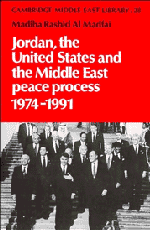Book contents
- Frontmatter
- Contents
- Foreword by William B. Quandt
- Acknowledgements
- Prologue
- 1 Introduction
- 2 Kissinger's legacy and imprint on the Middle East
- Part I Jordan in the Carter Middle East policy
- 3 Carter picks up the threads
- 4 The Camp David accords and Jordan
- 5 An evaluation of the development of American strategy for the 1980s
- Part II Jordan in the Reagan Middle East policy
- Part III US, Jordan and Arab approaches to peace
- Appendices
- Notes
- Select bibliography
- Index
- Cambridge Middle East Library
5 - An evaluation of the development of American strategy for the 1980s
Published online by Cambridge University Press: 25 February 2010
- Frontmatter
- Contents
- Foreword by William B. Quandt
- Acknowledgements
- Prologue
- 1 Introduction
- 2 Kissinger's legacy and imprint on the Middle East
- Part I Jordan in the Carter Middle East policy
- 3 Carter picks up the threads
- 4 The Camp David accords and Jordan
- 5 An evaluation of the development of American strategy for the 1980s
- Part II Jordan in the Reagan Middle East policy
- Part III US, Jordan and Arab approaches to peace
- Appendices
- Notes
- Select bibliography
- Index
- Cambridge Middle East Library
Summary
Every new American administration feels it has a mandate for a new foreign policy. But the new men soon discover that the problems they face are more intractable than they had expected, and the virtues of continuity come to be applauded more than the merits of innovation.
President Carter was no exception. Initially stirred by the moral dimension of the Palestinian problem, he undertook a complete break from Kissinger's approach by propagating the idea of a homeland for the Palestinians and embarking on the Geneva process, which he thought would gradually resolve the Palestinian dimension of the Arab – Israeli conflict within a comprehensive solution of the Middle Eastern problem. When confronted with formidable obstacles, however, he drifted into another process, hoping to achieve at Camp David what he failed to do in Geneva. But the whole exercise proved to be a long shot for which he was not prepared. Faced by what was in effect an Israeli version of a fundamentalist Ayatollah, determined to implement his own autonomy plan for the Palestinians in the occupied territories, he initially protested, ‘No self-respecting Arab world would accept your plan. This looks like subterfuge’ and at one stage even went so far as to call Begin a psychopath. But he was not willing to stand up to him. Even the issue of linkage between an Egyptian – Israeli settlement and the West Bank/Gaza negotiations, which he had pledged at the outset of Camp David as the single most important question, was not sustained.
- Type
- Chapter
- Information
- Publisher: Cambridge University PressPrint publication year: 1993



